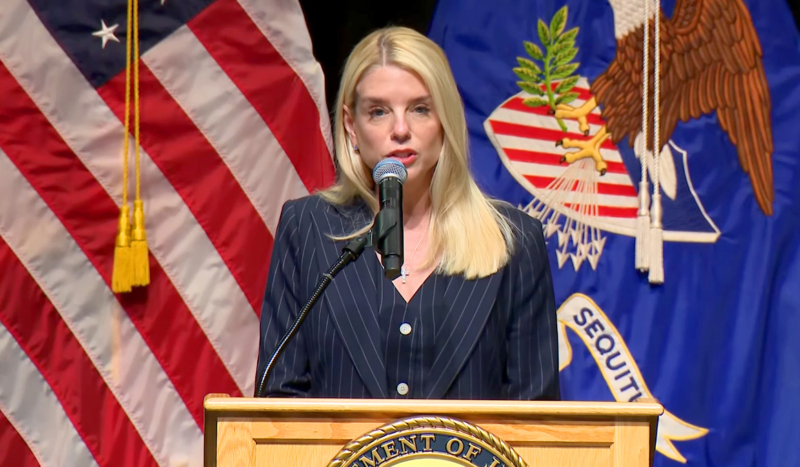
https://catholicvote.org/wp-content/uploads/2025/06/Religious-Liberty-commission-meets-and-bishop-barron-etc-talk-secularist-aggression.jpg
At the first hearing of President Donald Trump’s Religious Liberty Commission, Bishop Robert Barron of the diocese of Winona-Rochester in Minnesota wondered: “Have we religious people been too cowed by a secular society that wants us to privatize the faith, that we haven’t seized the opportunity of the First Amendment?”
Barron – founder of the wildly popular global media apostolate Word on Fire – reflected Monday at Washington, DC’s Museum of the Bible on the purpose of the Religious Liberty Commission and the serious threats to religious freedom in our nation today.
The discussion among commission members focused for a time on the suppression of faith in public places by the use of threats to remove government funding.
Barron offered that the issue reminded him of the fact that some of the very institutions silencing faith are hospitals and universities – many of which have their origins in the Church.
“You know, hospitals as we know them came up out of the Church, and universities as we know them,” the bishop explained. “The Church has been bold in the way it moves into the public space.”
“I wonder,” he added, “have we religious people been too cowed by a secular society that wants us to privatize the faith, that we haven’t seized the opportunity of the First Amendment?”
“We’ll make no laws restricting the free exercise of religion – good!” Barron continued. “Then we shouldn’t stay in our little self-imposed ghettos.… So, let’s invade that space. I wonder if we’ve been so affected almost psychologically by this – the wall of separation and the etiquette of privatizing our faith… Well, this is something that’s obviously opposed to religion, but also opposed to the best instincts of our own First Amendment.”
In a later interview with EWTN, Barron elaborated that it’s his hope the threats against religious freedom will become more apparent through the commission’s work.
“And the struggle that’s going on is there are real threats to religious liberty, and I hope we can address those,” he said.
Asked how average Catholic laypeople can protect religious freedom, Barron responded, “I would say live your faith boldly and publicly.”
“So, when we talk about, in the First Amendment, that Congress makes no law prohibiting the free exercise of religion,” Barron said, “I think that opens up a space for free expression of your religion.”
The bishop expanded as well upon his notion that we live in a “culture of self-invention,” referring to a mindset characterized by the sentiment “I invent who I am, I choose value, I choose the meaning of my life – what matters is I’m authentic, I’m true to myself.”
Barron called that sentiment a “hyper-valorization of freedom” and said it has led to a “cultural crisis.”
“I think the whole point is to surrender your freedom to the truth,” he asserted, citing Pope Saint John Paul II, who taught that “you find your true freedom in surrendering to the truth.”
“And I think that’s what we’re up against, because in this culture self-invention is very aggressive,” Barron warned. “It wants to be the dominant philosophy of the world. And, so, it wants religion out of the public space. It wants religion out of health care, wants it out of education, so that this philosophy can become predominant. I do think that’s the unique texture of the struggle today in religious liberty.”
The commission is tasked with advising “the White House Faith Office and the Domestic Policy Council on religious-liberty policies” and recommending “executive or legislative actions to protect these freedoms.”
Trump established the body on May 1 via an executive order, stating in an accompanying “fact sheet” that the Biden-Harris administration had “targeted peaceful Christians while ignoring violent, anti-Christian offenses.”
“This Commission will investigate and recommend policies to restore and safeguard religious liberty for all Americans,” the administration noted.
US Attorney General Pam Bondi said during the hearing that the Department of Justice is prepared to use “every legal and constitutional tool available to ensure Americans can live out their faith freely without fear.”
As The Defender reported, the commission is already being asked to address the matter of parents in four states – California, New York, Connecticut, and Maine – being denied religious exemptions to childhood vaccination requirements.
A letter submitted June 4 to Trump and the commission by a coalition of religious liberty and medical freedom groups called attention to the policies enacted in those states.
“These states deny religious exemptions to childhood vaccination requirements, barring children of religious families from schools, including faith-based ones, and denying healthcare access,” wrote lead organization Guiding The Impact. “This forces families to choose between their sincere religious beliefs and their children’s education and healthcare.”
The coalition urged the president to issue an executive order on July 4, 2025 “modeled after your February 14, 2025 order ending COVID-19 vaccine mandates by withholding discretionary federal funds from educational institutions denying religious exemptions to federally recommended vaccines, ensuring access to education and daycare for religious families.”
The groups also called on Bondi “to initiate legal action against these states for First Amendment violations” and asked Health and Human Services Secretary Robert F. Kennedy, Jr. “to prohibit federally funded medical providers from denying non-emergency care based on religious objections to vaccination.”
Children’s Health Defense (CHD) CEO Mary Holland, who attended Monday’s commission hearing, commented that “health freedom and religious freedom are inextricably intertwined … While there is much work for the commission to do, the meeting has raised hopes of a more robust interpretation of religious freedom going forward.”

